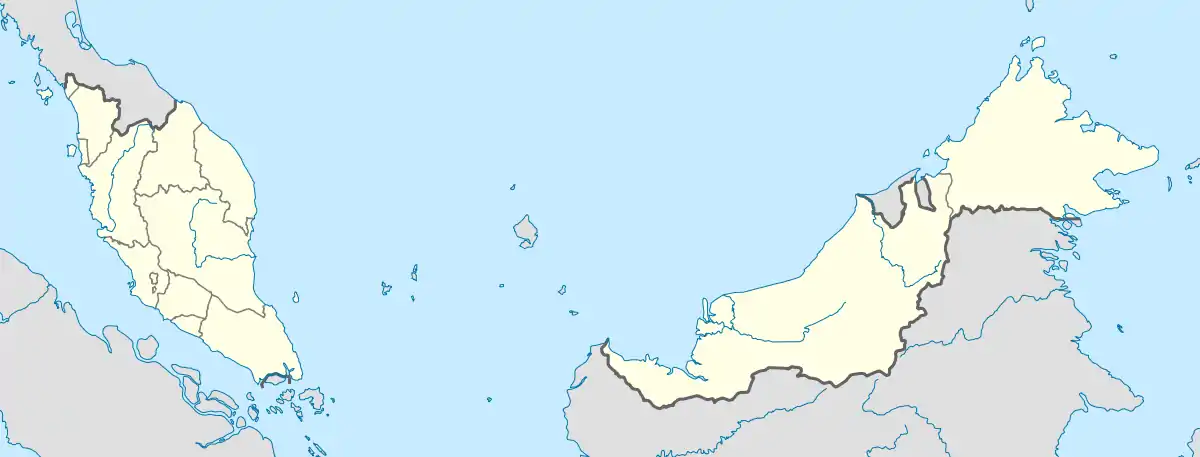Jelebu District
The Jelebu District (colloquially Jolobu) is the second-largest district in Negeri Sembilan, Malaysia after Jempol, with a population over 40,000. Jelebu borders on the Seremban district, Jempol district, Kuala Pilah district, Pahang and Selangor. Jelebu is a suburban district with blossoming semi-agricultural industry. Jelebu is also a parliamentary constituency of the Dewan Rakyat in the Malaysian Parliament. Kuala Klawang is the principal town of the district.
Jelebu District | |
|---|---|
| Daerah Jelebu | |
| Other transcription(s) | |
| • Jawi | جيليبو |
| • Chinese | 日叻务县 |
| • Tamil | ஜெலுபு |
 Location of Jelebu District in Negeri Sembilan | |
 Jelebu District Location of Jelebu District in Malaysia | |
| Coordinates: 3°0′N 102°05′E | |
| Country | |
| State | |
| Seat | Kuala Klawang |
| Local area government(s) | Jelebu District Council |
| Government | |
| • District officer | Syahrunizam Shahwan[1] |
| Area | |
| • Total | 1,349.89 km2 (521.20 sq mi) |
| Population (2010)[3] | |
| • Total | 37,287 |
| • Density | 28/km2 (72/sq mi) |
| Time zone | UTC+8 (MST) |
| • Summer (DST) | UTC+8 (Not observed) |
| Postcode | 71600 - 71650 |
| Calling code | +6-06 |
| Vehicle registration plates | N |

Jelebu has an infamous recorded history of British and Japanese colonization as compared to other parts of Negeri Sembilan. Numerous priceless colonial artefacts were discovered in the small semi-agricultural town of Sungai Muntoh, which was once a prosperous mining town a century ago. These artefacts are now displayed in the state museum. Titi and neighbouring Sungai Muntoh were the most developed towns of all mining sites in Jelebu. The booming tin industry was one of the main reasons for the massacre in Titi, where more than 1,500 people, mainly Chinese, were killed. Altogether, about 5,000 people were killed by the Japanese-led army during World War II.
Climate
Jelebu has the warmest climate recorded in Malaysian history. The southwestern part of Jelebu is considered as the driest place in Malaysia. However, in the mornings the temperatures are quite low and visibility is moderate due to the foggy climate.
Administrative divisions

Jelebu District is divided into 8 mukims, which are:[4]
- Glami Lemi
- Kenaboi
- Kuala Klawang (Capital)
- Peradong
- Pertang
- Triang Hilir
- Ulu Klawang
- Ulu Triang
Economy
The rubber and mining business made Malaya as one of the richest in natural resources during the British colonial period. Jelebu was one such district that produced some of the world's best quality rubber and steel. Pineapple production there is ranked one of the top in Peninsular Malaysia. For some unknown reasons, Jelebu is home to some of the state's biggest and most advanced rehabilitation centres.
Politics
Currently Jelebu constituency is represented in the Dewan Rakyat by Dato' Jalaluddin Bin Alias of UMNO, the leading party of the federal opposition coalition Barisan Nasional.[5]
In turn, Jelebu contributes 4 seats to the Negeri Sembilan State Legislative Assembly:
- Chennah;
- Kuala Klawang;
- Pertang; and
- Sungai Lui.
Sungai Lui constituency is part of Jelebu parliamentary constituency but in district administration, it was part of the Jempol District and therefore in the local government level it was administered by the Jempol Municipal Council (Majlis Perbandaran Jempol).
Federal Parliament and State Assembly Seats
List of Jelebu district representatives in the Federal Parliament (Dewan Rakyat)
| Parliament | Seat Name | Member of Parliament | Party |
|---|---|---|---|
| P126 | Jelebu | Jalaluddin Bin Alias | Perikatan Nasional (UMNO) |
List of Jelebu district representatives in the State Legislative Assembly (Dewan Undangan Negeri)
| Parliament | State | Seat Name | State Assemblyman | Party |
|---|---|---|---|---|
| P126 | N1 | Chennah | Loke Siew Fook | Pakatan Harapan (DAP) |
| P126 | N2 | Pertang | Noor Azmi Bin Yusof | Perikatan Nasional (UMNO) |
| P126 | N4 | Klawang | Bakri Bin Sawir | Pakatan Harapan (AMANAH) |
See also
References
- http://jelebu.ns.gov.my/pdtjel/my/#
- "Laman Web Rasmi Pejabat Daerah Dan Tanah Jelebu - Profil Daerah Jelebu". jelebu.ns.gov.my.
- "Population Distribution and Basic Demographic Characteristics, 2010" (PDF). Department of Statistics, Malaysia. Archived from the original (PDF) on 22 May 2014. Retrieved 19 April 2012.
- http://apps.water.gov.my/jpskomuniti/dokumen/JPS@Komuniti%20Daerah%20Jelebu.pdf
- "Ahli Parlimen". Portal Rasmi Parlimen Malaysia. Retrieved 23 December 2018.
| Wikimedia Commons has media related to Jelebu District. |